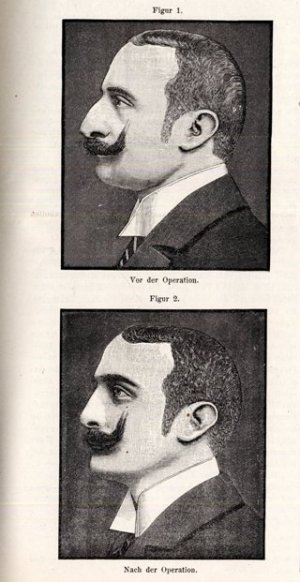

Ueber die operative Verkleinerung einer Nase (Rhinomiosis) (pp.882-885, 5 Abb.). – Buch antiquarisch kaufen
Möchten Sie selbst antiquarische Bücher verkaufen? So einfach geht's …
dieses Buch wurde bereits 85 mal aufgerufen
versandkostenfrei
antiquarisches Buch
Sofort bestellen | Anfragen | In den Warenkorb
Verwandte Artikel
Verkäufer/in dieses Artikels
>> Benutzer-Profil (Impressum) anzeigen
>> AGB des Verkäufers anzeigen
>> Verkäufer in die Buddylist
>> Verkäufer in die Blocklist
Angebote: Bücher (32021)
Schaufenster von
MedicusBooks.Com
Angebotene Zahlungsarten
- Banküberweisung (Vorkasse)
(Vorkasse)
Ihre allgemeinen Versandkosten
| Allgemeine Versandkosten gestaffelt nach Gewicht | |||||
|---|---|---|---|---|---|
| Landweg | Luftweg | ||||
| Gewicht | Deutschland | EU | Welt | EU | Welt |
| bis 3000 g | 6,95 € | — | — | 14,75 € | 36,40 € |
| bis 5000 g | 7,95 € | — | — | 15,75 € | 58,15 € |
| bis 8000 g | 8,50 € | — | — | 18,55 € | 87,15 € |
| bis 15000 g | 12,50 € | — | — | 25,20 € | 137,90 € |
| bis 20000 g | 14,50 € | — | — | 30,20 € | 188,65 € |
| darüber | 16,50 € | — | — | 40,20 € | 232,00 € |
Hinweis: Unten genannte pauschalen Versandkosten werden nur verwendet, wenn bei einem Angebot die Gewichtsangabe fehlt; ansonsten wird der Versand nach der Gewichts-Staffel berechnet.
| Landweg | Luftweg | ||||
| Deutschland | EU | Welt | EU | Welt | |
| Versand pauschal | 6,95 € | 13,50 € | 32,50 € | 13,50 € | 36,50 € |
| Versandkostenfrei ab | 400,00 € | 500,00 € | 500,00 € | 600,00 € | 800,00 € |
Bei gleichzeitiger Bestellung mehrerer Artikel bei diesem Verkäufer gilt für den Versand innerhalb Deutschlands: ab einer Bestellung von 2 Artikeln mit einem Gewicht von insgesamt zwischen 300 und 1000 Gramm wird ein fiktives Gesamtgewicht von mindestens 1001 Gramm zugrunde gelegt.
Zusätzliche Vertrags-, Versand-, Liefer- und Zahlungsbedingungen
Für Porto und Verpackung: Bis 500g 1,10 Euro, bis 1 kg 1,60 Euro, bis 2 kg 4,50 Euro, darüber nach Vereinbarung. Zahlung per Vorauskasse (Überweisung).Regelungen zum Widerruf bzw. zur Rückgabe
Widerrufsbelehrung
Als Verbraucher haben Sie folgendes Widerrufsrecht, sofern Sie Unternehmer sind, gilt dieses Widerrufsrecht nicht:
Widerrufsbelehrung
Widerrufsrecht
Sie haben das Recht, binnen vierzehn Tagen ohne Angabe von Gründen diesen Vertrag zu widerrufen.
Die Widerrufsfrist beträgt vierzehn Tage ab dem Tag, an dem Sie oder ein von Ihnen benannter Dritter, der nicht der Beförderer ist, die letzte Ware in Besitz genommen haben bzw. hat.
Um Ihr Widerrufsrecht auszuüben, müssen Sie uns Antiquariat für Medizin, Fritz-Dieter Söhn, Renthof 8, 35037 Marburg, Telefon 0049 6421 66002, MedicusBooks.Com, [email protected] mittels einer eindeutigen Erklärung (z. B. ein mit der Post versandter Brief, Telefax oder E-Mail) über Ihren Entschluss, diesen Vertrag zu widerrufen, informieren. Sie können dafür das beigefügte Muster-Widerrufsformular verwenden, das jedoch nicht vorgeschrieben ist.
Sie können das Muster-Widerrufsformular oder eine andere eindeutige Erklärung auch auf unserer Webseite medicusbooks.com elektronisch ausfüllen und übermitteln, bzw. per E-Mail anfordern.
Machen Sie von dieser Möglichkeit Gebrauch, so werden wir Ihnen unverzüglich (z. B.per E-Mail) eine Bestätigung über den Eingang eines solchen Widerrufs übermitteln.
Zur Wahrung der Widerrufsfrist reicht es aus, dass Sie die Mitteilung über die Ausübung des Widerrufsrechts vor Ablauf der Widerrufsfrist absenden.
Folgen des Widerrufs
Wenn Sie diesen Vertrag widerrufen, haben wir Ihnen alle Zahlungen, die wir von Ihnen erhalten haben, einschließlich der Lieferkosten (mit Ausnahme der zusätzlichen Kosten, die sich daraus ergeben, dass Sie eine andere Art der Lieferung als die von uns angebotene, günstigste Standardlieferung gewählt haben), unverzüglich und spätestens binnen vierzehn Tagen ab dem Tag zurückzuzahlen, an dem die Mitteilung über Ihren Widerruf dieses Vertrags bei uns eingegangen ist. Für diese Rückzahlung verwenden wir dasselbe Zahlungsmittel, das Sie bei der ursprünglichen Transaktion eingesetzt haben, es sei denn, mit Ihnen wurde ausdrücklich etwas anderes vereinbart; in keinem Fall werden Ihnen wegen dieser Rückzahlung Entgelte berechnet. Wir können die Rückzahlung verweigern, bis wir die Waren wieder zurückerhalten haben oder bis Sie den Nachweis erbracht haben, dass Sie die Waren zurückgesandt haben, je nachdem, welches der frühere Zeitpunkt ist.
Sie haben die Waren unverzüglich und in jedem Fall spätestens binnen vierzehn Tagen ab dem Tag, an dem Sie uns über den Widerruf dieses Vertrags unterrichten, an Antiquariat für Medizin, Fritz-Dieter Söhn, Renthof 8, 35037 Marburg zurückzusenden oder zu übergeben. Die Frist ist gewahrt, wenn Sie die Waren vor Ablauf der Frist von vierzehn Tagen absenden. Sie tragen die unmittelbaren Kosten der Rücksendung der Waren.
Sie müssen für einen etwaigen Wertverlust der Waren nur aufkommen, wenn dieser Wertverlust auf einen zur Prüfung der Beschaffenheit, Eigenschaften und Funktionsweise der Waren nicht notwendigen Umgang mit ihnen zurückzuführen ist.
Ende der Widerrufsbelehrung


